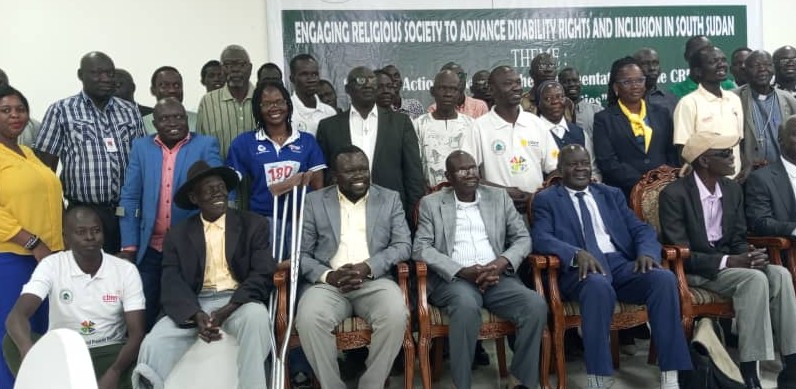
South Sudan’s Ministry of Gender, Child and Social Welfare is partnering with religuous leaders to push for implementation of the United Nations Convention on Rights of Persons with Disabilities (CRPD) in South Sudan.
The drive comes after President Salva Kiir signed the United Nations Convention on the Rights of Persons with Disabilities (CRPD) into law on February 24, 2023, a move that legally commits South Sudan to protecting and promoting the rights of its citizens with disabilities.
To effect its implementation, a two-day workshop under the theme “Faith in Action: Advancing the Implementation of the CRPD for Inclusive Communities” is underway from August 14-15, 2025.
The event is a collaborative effort funded by the Dutch Ministry of Foreign Affairs and supported by a consortium of organizations including ZOA, the African Disability Forum, See Your Foundation, Light for the World, The Leprosy Mission Netherlands, VNG International, and The Hague Academy for Local Governance.
It aims to engage the religious society to advance disability rights and inclusion in South Sudan.
Speaking after the workshop, Emmanuel Lobari, director of disability at the National Ministry of Gender, Child and Social Welfare, said the workshop aimed to involve religious leaders in promoting the inclusion of persons with disabilities.
“We thought of bringing them together, all Christians and Muslims, to make sure that we disseminate to them the UN Convention on the Rights of Persons with Disabilities,” Lobari said.
South Sudan has become a part of the International Treaty on the Rights of Persons with disabilities after President Kiir signed it into law on February 24, 2023.
This commitment, according to Director Lobari, requires the Ministry of Gender to implement the treaty by engaging with religious leaders to spread the message at the grassroots level.
“They (religious leaders) have to play their role in implementation of this convention that was signed, and to make sure that we take it to the grassroots, starting from the national level to the grassroots, and the message has to go, making sure that we have inclusive nation whereby persons with disabilities will enjoy equal participation and the rights,” he added.
Meanwhile, Pastor Isaiah Malek Garang, a religious representative and a country advisory board member for “WE Are Able” on disability inclusion, said that the church plays a great role in the inclusion of persons with disabilities.
“When you take your message through the religious society, it can go faster. Because in the religious society, we meet every week. On Fridays, Saturdays, and Sundays in the churches and the mosque. So it has been seen as an opportunity for the message of disability inclusion to go faster in South Sudan,” Malek said.
While praising the government’s commitment, leaders are also calling for wider implementation.
“I appreciate our president for signing disability bill, that is a national action plan. It has become a law now in South Sudan. So our government should also apply inclusion in all the private sectors,” he appealed.
Augustino Wudu Elario, the chairperson for the South Sudan Union of Persons with Disabilities, urged the government to commit to implementing the rights of persons with disabilities.
“The government, together with stakeholders, is to commit itself to implementing the convention. And to implement the convention… dissemination is very important,” Elario stated.
He pointed out a critical gap, noting that many people, “including government officials holding public institutions, are not informed about the usefulness of persons with disabilities.”

